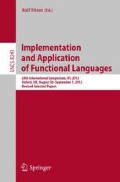Abstract
Embedded languages in Haskell benefit from a range of type extensions, such as type families, that are subsumed by dependent types. However, even with those type extensions, embedded languages for data parallel programming lack desirable static guarantees, such as static bounds checks in indexing and collective permutation operations.
This observation raises the question whether an embedded language for data parallel programming would benefit from fully-fledged dependent types, such as those available in Agda. We explored that question by designing and implementing an Agda frontend to Accelerate, a Haskell-embedded language for data parallel programming aimed at GPUs. We discuss the potential of dependent types in this domain, describe some of the limitations that we encountered, and share some insights from our preliminary implementation.
Access this chapter
Tax calculation will be finalised at checkout
Purchases are for personal use only
Notes
- 1.
An identifier can be an almost arbitrary string of Unicode characters except spaces, parentheses, and curly braces. Agda also supports mixfix syntax with the position of arguments indicated by underscores in the defining occurrence of an identifier.
- 2.
To distinguish Haskell code from Agda code, we display Haskell code in a framed boxes.
- 3.
Accelerate employs caching to avoid the transfer of arrays that are already available in GPU memory.
- 4.
\(\top \) is a one-element type, whereas \(\bot \) is a type without elements. These types customarily represent truth and falsity.
- 5.
In Agda, arguments in double curly braces are instance arguments [5] that are aggressively inferred. We use them like type class constraints in Haskell.
- 6.
Recent work on Haskell’s type system manages to avoid this issue [19].
- 7.
Accelerate currently does not support Maybe types as array elements.
References
Bove, A., Dybjer, P., Norell, U.: A brief overview of agda - a functional language with dependent types. In: Berghofer, S., Nipkow, T., Urban, C., Wenzel, M. (eds.) TPHOLs 2009. LNCS, vol. 5674, pp. 73–78. Springer, Heidelberg (2009)
Catanzaro, B., Garland, M., Keutzer, K.: Copperhead: Compiling an embedded data parallel language. Technical Report UCB/EECS-2010-124. University of California, Berkeley (2010)
Chakravarty, M.M.T., Keller, G., Lee, S., McDonell, T.L., Grover, V.: Accelerating Haskell array codes with multicore GPUs. In: Carro, M., Reppy, J.H. (eds.) Workshop on Declarative Aspects of Multicore Programming, DAMP 2011, Austin, TX, USA, January 2011, pp. 3–14. ACM (2011)
Chakravarty, M.M.T., Keller, G., Peyton Jones, S.: Associated type synonyms. In: Pierce, B.C. (ed.) Proceedings International Conference on Functional Programming 2005, Tallinn, Estonia, September 2005, pp. 241–253. ACM Press, New York (2005)
Devriese, D., Piessens, F.: On the bright side of type classes: Instance arguments in Agda. In: Danvy, O. (ed.) Proceedings International Conference on Functional Programming 2011, Tokyo, Japan, September 2011, pp. 143–155. ACM Press, New York (2011)
Goldberg, D.: What every computer scientist should know about floating-point arithmetic. ACM Comput. Surv. 23(1), 5–48 (1991)
Jones, S.L.P., Vytiniotis, D., Weirich, S., Washburn, G.: Simple unification-based type inference for GADTs. In: Lawall, J. (ed.) ICFP, Portland, Oregon, USA, September 2006, pp. 50–61. ACM Press, New York (2006)
Keller, G., Chakravarty, M.M., Leshchinskiy, R., Peyton Jones, S., Lippmeier, B.: Regular, shape-polymorphic, parallel arrays in Haskell. In: Proceedings of the 15th ACM SIGPLAN International Conference on Functional Programming, ICFP 2010. ACM (2010)
Martin-Löf, P.: Intuitionistic Type Theory. Bibliopolis, Napoli (1984)
Norell, U.: Dependently typed programming in Agda. In: Koopman, P., Plasmeijer, R., Swierstra, D. (eds.) AFP 2008. LNCS, vol. 5832, pp. 230–266. Springer, Heidelberg (2009)
Peebles, D.: A dependently typed model of the Repa library in Agda. https://github.com/copumpkin/derpa (2011)
Rose, J.R., et al.: C\(^*\): An extended c language for data parallel programming. In: Proceedings of the Second International Conference on Supercomputing, pp. 2–16 (1987)
Saraswat, V.: Report on the programming language X10. http://dist.codehaus.org/x10/documentation/languagespec/x10-200.pdf. October 2009. Version 2.0
Schrijvers, T., Peyton Jones, S.L., Chakravarty, M.M.T., Sulzmann, M.: Type checking with open type functions. In: Thiemann, P. (ed.) Proceedings International Conference on Functional Programming 2008, Victoria, BC, Canada, October 2008, pp. 51–62. ACM Press, New York (2008)
Swierstra, W.: More dependent types for distributed arrays. Higher-Order Symbolic Comput., pp. 1–18 (2010)
Swierstra, W., Altenkirch, T.: Dependent types for distributed arrays. In: Trends in Functional Programming, vol. 9 (2008)
Tarditi, D., Puri, S., Oglesby, J.: Accelerator: using data parallelism to program GPUs for general-purpose uses. In: ASPLOS-XII: Proceedings of the 12th International Conference on Architectural Support for Programming Language and Operating Systems, pp. 325–335. ACM (2006)
Xi, H.: Dependent ML: An approach to practical programming with dependent types. J. Funct. Program. 12(2) (2007)
Yorgey, B.A., Weirich, S., Cretin, J., Jones, S.L.P., Vytiniotis, D., Magalhães, J.P.: Giving Haskell a promotion. In: Pierce, B.C. (ed.) Proceedings of TLDI 2012, Philadelphia, PA, USA, January 2012, pp. 53–66. ACM (2012)
Author information
Authors and Affiliations
Corresponding author
Editor information
Editors and Affiliations
Rights and permissions
Copyright information
© 2013 Springer-Verlag Berlin Heidelberg
About this paper
Cite this paper
Thiemann, P., Chakravarty, M.M.T. (2013). Agda Meets Accelerate. In: Hinze, R. (eds) Implementation and Application of Functional Languages. IFL 2012. Lecture Notes in Computer Science(), vol 8241. Springer, Berlin, Heidelberg. https://doi.org/10.1007/978-3-642-41582-1_11
Download citation
DOI: https://doi.org/10.1007/978-3-642-41582-1_11
Published:
Publisher Name: Springer, Berlin, Heidelberg
Print ISBN: 978-3-642-41581-4
Online ISBN: 978-3-642-41582-1
eBook Packages: Computer ScienceComputer Science (R0)

